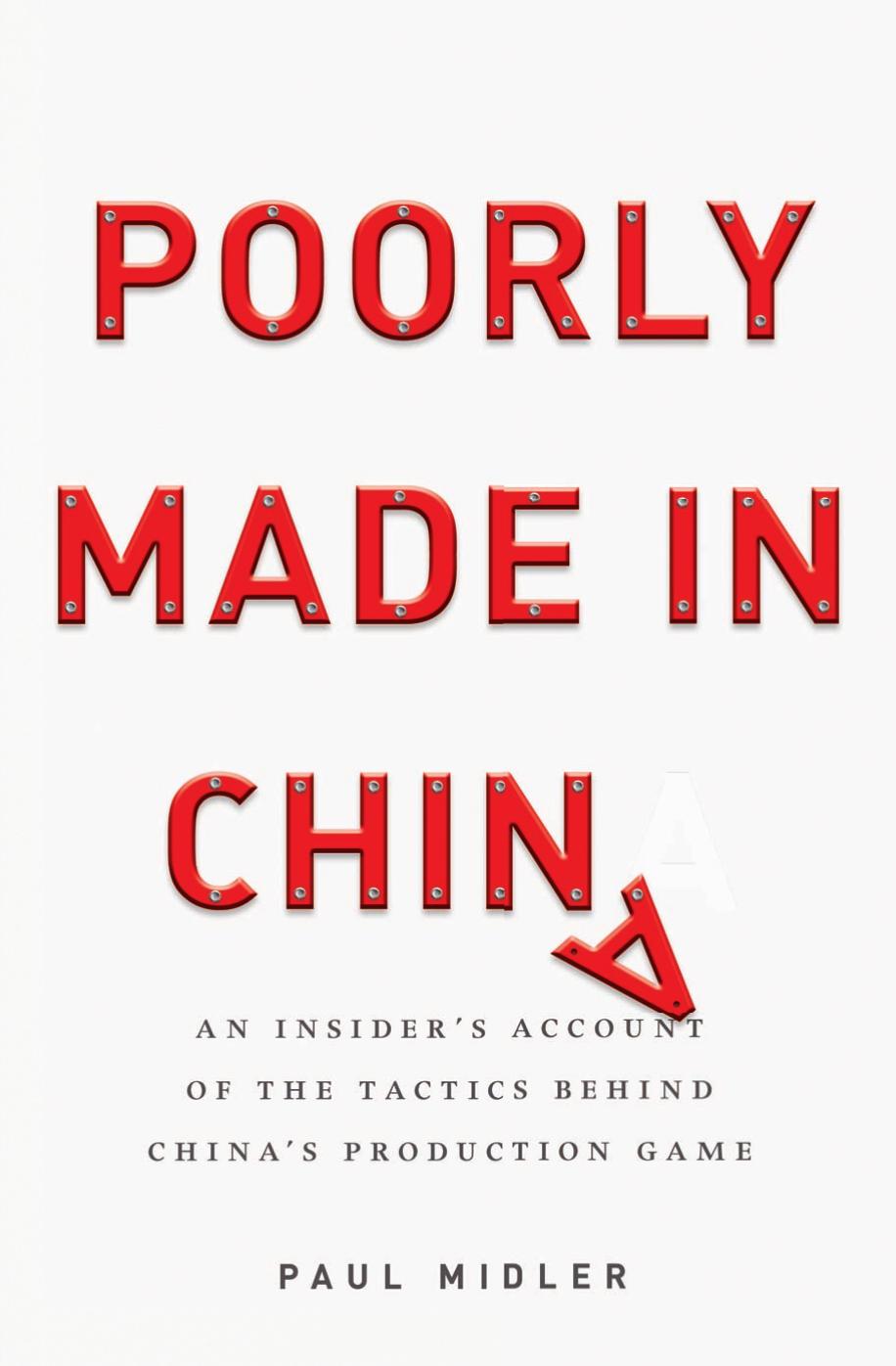Poorly Made in China: An Insider's Account of the Tactics Behind China's Production Game by Paul Midler

Author:Paul Midler
Language: eng
Format: mobi, epub, pdf
Tags: Industries, Work environment, Manufacturing Industries, Work environment - China, Marketing, Asia, General, China, Business & Economics, Manufactures - China, International, China - Economic conditions - 2000, Economic Conditions, Manufactures, History
ISBN: 9780470405581
Publisher: Wiley
Published: 2009-03-18T04:00:00+00:00
CHAPTER 12
No Animal Testing
Bernie mentioned that we would soon have visitors. Shop Corp, our largest customer, wanted to come in and conduct its own inspection. The visit would help secure more orders, Bernie explained, but he had concerns that the customer might learn too much. Bernie had claimed that Johnson Carter was a joint-venture partner in the factory, and it was precisely during an actual visit to the plant that this fiction might come to light.
When I explained to Sister that Bernie wanted the information of ownership to be kept secret, she said that she could do one better. She offered to have a sign made and hung on the front of the factory that listed Johnson Carter as an actual owner.
It was common practice in South China for manufacturers to do whatever was necessary to lock in a major piece of business. Claiming that someone was a partner was seen as only a small fudge, and at some factories in the region, you could find three, four, or even five names on a board near the entrance of the company. Manufacturers would say that these were the names of their business partners, or sometimes they indicated them as "brands." Most would reply, when asked, that they were nothing.
When the executive from Shop Corp, Donald, arrived at the factory and saw the plaque that had both Johnson Carter's and King
Chemical's names on it, he was satisfied. It proved that the two companies were, indeed, joint-venture partners.
For the first time in many months, I went through the routine of putting on a white lab coat and hat for our visiting guests. We gave the visiting executive the same kind of tour that I had been given when I first arrived at King Chemical. The questions that Donald asked were no better than the questions I asked on my very first tour of the factory. He was concerned about conditions of the workers, as many visiting Americans are.
"How many days do they get off?" he asked.
Sister gave the standard Chinese answer. "Two days," she said.
"Two days is pretty good," he said.
Donald didn't realize that she meant two days per month. The workers typically took off one day every other week. When told this, he was struck dumb, unable to imagine it, and all he could say was, "Oh, my."
Worker conditions concerned many foreigners, in part because they knew that Chinese workers earned less. Donald next asked me whether we had any issues with sabotage.
"What do you mean?" I asked.
"Don't you ever worry that one of the workers might intentionally harm the product?"
It was the first time that anyone had asked this question, and it was perhaps the first time that I had even considered it. Sabotage was not a concern in China, I assured him, not like it was in the United States anyway. Factory workers saw no sense in throwing a wrench into the works. Most figured—what would be the point?
Chinese laborers earned more than their counterparts in the provinces, and they did not want to be fired from their jobs.
Download
Poorly Made in China: An Insider's Account of the Tactics Behind China's Production Game by Paul Midler.epub
Poorly Made in China: An Insider's Account of the Tactics Behind China's Production Game by Paul Midler.pdf
This site does not store any files on its server. We only index and link to content provided by other sites. Please contact the content providers to delete copyright contents if any and email us, we'll remove relevant links or contents immediately.
| Direct | Global |
| Industrial | Multilevel |
| Product Management | Research |
| Telemarketing | Web Marketing |
Influence: The Psychology of Persuasion by Robert B. Cialdini(4796)
The Miracle Morning by Hal Elrod(4727)
The Hacking of the American Mind by Robert H. Lustig(4383)
Pre-Suasion: A Revolutionary Way to Influence and Persuade by Robert Cialdini(4232)
Unlabel: Selling You Without Selling Out by Marc Ecko(3663)
Ogilvy on Advertising by David Ogilvy(3622)
Hidden Persuasion: 33 psychological influence techniques in advertising by Marc Andrews & Matthijs van Leeuwen & Rick van Baaren(3565)
Purple Cow by Seth Godin(3203)
Who Can You Trust? by Rachel Botsman(3133)
Kick Ass in College: Highest Rated "How to Study in College" Book | 77 Ninja Study Skills Tips and Career Strategies | Motivational for College Students: A Guerrilla Guide to College Success by Fox Gunnar(3129)
The Marketing Plan Handbook: Develop Big-Picture Marketing Plans for Pennies on the Dollar by Robert W. Bly(3062)
This Is Marketing by Seth Godin(3038)
I Live in the Future & Here's How It Works by Nick Bilton(2997)
The Power of Broke by Daymond John(2986)
The Tipping Point by Malcolm Gladwell(2922)
Building a StoryBrand by Donald Miller(2912)
The 46 Rules of Genius: An Innovator's Guide to Creativity (Voices That Matter) by Marty Neumeier(2855)
Draw to Win: A Crash Course on How to Lead, Sell, and Innovate With Your Visual Mind by Dan Roam(2784)
Market Wizards by Jack D. Schwager(2700)
